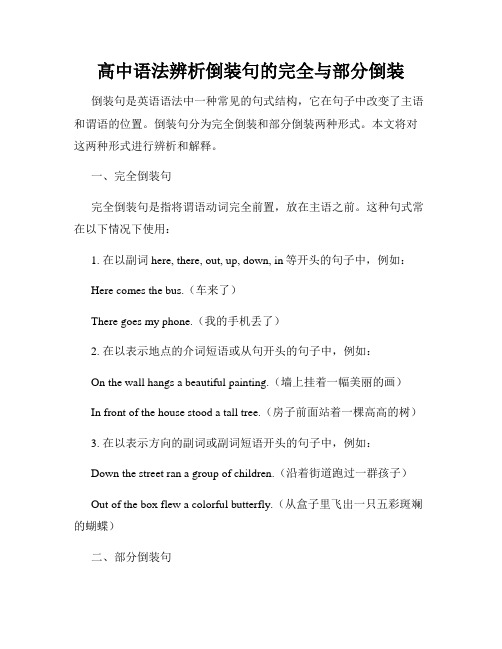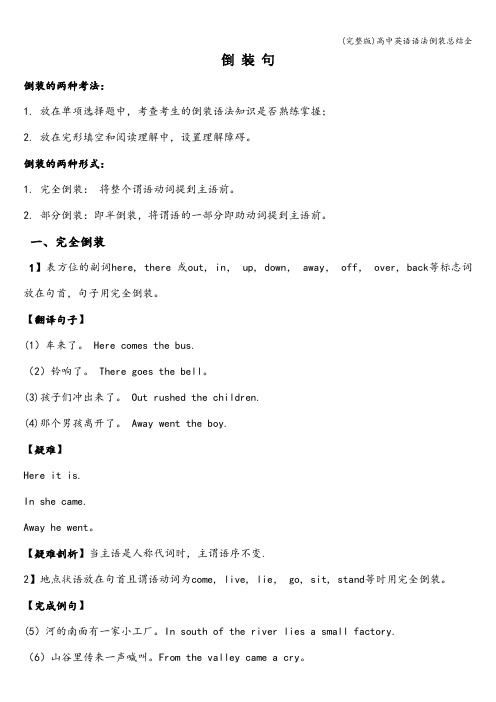高中英语语法半倒装
高中英语语法倒装句

1.His mother had talked to him for many minutes while he was watching TV, but ____. A. a little did he hear B. little did he hear C. little heard he D. a little heard he 2.—— Hello, Zhu Hua. I’ll have to return to Canada because I’ve worked here for a year. —— _____! What time flies B. How time flies C. What does time fly D. How does time fly 3. During the war, ____but also he lost his wife and his child. not was his job in the lab taken away B. not only was his job in the lab taken away C. not merely his job in the lab was taken away D. not just was taken away his job in the lab
C
D
11.— The old man wouldn’t stay at home for a rest even if it rained. — ____.He would feel sick if he stayed home for one day. A. So would my grandpa B. So wouldn’t my grandpa C. Neither would my grandpa D. Nor wouldn’t my grandpa 12.___for us to surf (冲浪) on the sea in summer! A. What exciting is it B. How exciting is it C. What exciting it is D. How exciting it is 13.By no means ___ to our plan for the trip. A. will she agree B. she will agree C. agrees she D. will agree she
高中英语语法之——倒装句

3于. s另o 一放人句;首,表示前面所说的情况也适用 He likes rice very well. So do I. He can ride a bike. So can I.
n也ei适th用er,于n另or一放人句.首,表示前面所说的情况 I have never been abroad. Neither has he. I didn’t read the notice on the blackboard, nor did he.
Hale Waihona Puke 部分倒装: 1.否定词或半否定词放句首时。 Never shall I forget it. Not a single mistake did he make. Not only was there no electricity, but also no water. 2 “only+状语” 位于句首时。 Only then did I realize that I was wrong. Only in this way can you learn from your friends. Only when the war was over in 1949 was he able to get back home.
全部倒装
1.
介词短语放句首,且谓语为不及物动词 的句子
On the wall hangs a map of China.
放2.句he首re,, th且er主e,语ou不t,是aw人ay称, u代p,词d的ow句n等子副。词 Here comes the bus. There goes the bell. Out rushed the children. Away went the boy.
高中英语语法——倒装句

倒装句倒装的原因:①语法原因②强调③平衡句子结构④承上启下完全倒装:整个谓语都在主语之前。
部分倒装:助动词/be/情态动词等放在主语之前。
一、完全倒装:整个谓语都在主语之前1. there be句型(特殊的全部倒装句型):其中be可换为appear, come,exist, happen,lie,live,stand等动词。
[exist/iɡ'zɪst/ vi.存在;生存]There is an experienced teacher and many lovely students in the classroom. 教室里有一位经验丰富的老师和许多可爱的学生。
There stands a temple on the top ofthe mountain. 山顶上有座庙。
2. 将here, there, now, then等地点或时间副词置于句首,且谓语动词是be, come, go, remain, lie, run等,且主语为名词时,用完全倒装。
—Is everyone here? 每个人都在这儿吗?—Not yet ... Look, there come the rest of our guests! 还没有。
看,其余的客人来了。
Here comes my list of dos and don’ts:... 下面是我的行为准则:...Here is some advice for you to follow while listening to his lecture.下面是你听他的报告时可以遵循的一些建议。
3. 表示运动方向的副词out, in, up, down, away等置于句首,谓语是表示运动的动词,且主语为名词时,句子要用完全倒装。
In the dark corner of the room, up jumped the cat and caught the mouse. 在房间黑暗的角落里,那只猫跳了上去并抓住了那只老鼠。
高中英语语法 倒装句

5. 在so…that 句型中,so…提到句时:
1. So carelessly did he drive that he almost killed himself.
Grammar Inversion 倒装
英语倒装句分为两种:
1、整个谓语在主语前的句子,叫
完全倒装。
In came our English teacher. There is a table in the room.
2、部分谓语(情态动词、主动词、连系 动词)在前,谓语的主体部分仍在主语之 后的句子,叫不完全倒装句/部分倒装。
二、不完全倒装
Only Only
in this way can you master English. then did we realize that the man
was blind.
Only when the war was over in 1918 was
he able to get happily back to work.
2. 用于副词(here、there、now、 out、 in、 then、up、down、away、over、 off、 back 等)开头的句子中。 The bus comes here. Here comes the bus.
The children went out. Out went the children. The horses went off.
高中英语语法:部分倒装

Only+___方__式_____状语位于句首 引起部分倒装
将情态动词提到主语之前构成部分倒装
only+状语位于句首 引起部分倒装
汉译英 2.直到那时我才意识到学习的重要性。 普通句: I realized the importance of learning until then. 高On级ly句th:en__d_id__I _re_a_l_iz_e___ the importance of learning. Only+___时__间_____状语位于句首 引起部分倒装
部分倒装
Look &Think
①
②
③
正常语序 部分倒装 完全倒 装
部分倒装
将谓语动词的一部分 提到主语之前
通常是将情态动词、 助动词和be动词提到
主语之前
1.only+状语位于句首 引起部分倒装 2.Not only位于句首 引起部分倒装
only+状语位于句首 引起部分倒装
汉译英 1.只有努力学习我们才能成功。 普通句: We can succeed only by working hard.
将情态动词提到主语之前构成部分倒装
Not only位于句首 引起部分倒装
汉译英 他们不仅热爱学习数学,他们还热爱数学老师 普通句:
They love studying Math and they love Math teacher.
高级句:
Not only__d_o_e_s__th_e_y__lo_v_e___ studying Math,but we also love Math teacher.
高中英语:倒装总结

高中语法专项——倒装所谓倒装也就是谓语动词出现在主语之前的现象。
其中谓语动词全部放在主语之前的叫作全部或完全倒装;把谓语中的助动词或情态动词放在主语之前的则称为部分倒装。
一、全部倒装。
1.由here,there,now, then + come/go …时。
如:There goes the bell! Now comes your turn.。
2.副词out,in, into, away, up, down等置于句首时。
如:Out jumped a tiger from behind a rock. In came an old man with a long white beard.3. 当地点状语置于句首时。
如:At the corner of the street stands a newly-opened tea house.On the wall hang two pictures.但当主语为代词时,不用倒装结构。
Here they are.Out they went into the forest.Away they rushed when they saw some enemy soldiers running along.二、部分倒装1.在口语中,用在以so,neither,nor引起的缩略答语中,即So do sb./ Neither(nor) do sb.结构。
(So do sb: 两者比较,也是如此;So sb does: 同一个人再次确定,确实如此)2.only + 状语放句首。
如:1)Only when he reached school did he realize that he left his textbook at home.2)Only then did she see her mother.3)Only in this way can we improve our English.3.表否定意义的成分little; few; seldom; neither; nor; no; not; never; hardly; scarcely(很少)放在句首时。
高中语法辨析倒装句的完全与部分倒装

高中语法辨析倒装句的完全与部分倒装倒装句是英语语法中一种常见的句式结构,它在句子中改变了主语和谓语的位置。
倒装句分为完全倒装和部分倒装两种形式。
本文将对这两种形式进行辨析和解释。
一、完全倒装句完全倒装句是指将谓语动词完全前置,放在主语之前。
这种句式常在以下情况下使用:1. 在以副词here, there, out, up, down, in等开头的句子中,例如:Here comes the bus.(车来了)There goes my phone.(我的手机丢了)2. 在以表示地点的介词短语或从句开头的句子中,例如:On the wall hangs a beautiful painting.(墙上挂着一幅美丽的画)In front of the house stood a tall tree.(房子前面站着一棵高高的树)3. 在以表示方向的副词或副词短语开头的句子中,例如:Down the street ran a group of children.(沿着街道跑过一群孩子)Out of the box flew a colorful butterfly.(从盒子里飞出一只五彩斑斓的蝴蝶)二、部分倒装句部分倒装句是指将助动词或情态动词与主语之间的其他成分倒装,谓语动词仍然位于主语之后。
这种句式常在以下情况下使用:1. 在以表示否定意义的副词或词组开头的句子中,例如:Never have I seen such a beautiful sunset.(我从未见过如此美丽的日落)Under no circumstances should you give up.(无论如何,你都不应该放弃)2. 在以谓语动词的否定形式开头的句子中,例如:Not only does she play the piano, but she also sings.(她不仅会弹钢琴,还会唱歌)No sooner had I arrived home than it started raining.(我一到家就开始下雨)3. 在以“so + 形容词/副词 + 助动词/情态动词”结构开头的句子中,例如:So beautiful is the scenery that I want to stay here forever.(风景如此美丽,我想永远呆在这里)So quickly can he solve the math problem that it astonishes everyone.(他能如此快地解决这道数学题,让每个人都惊讶)总结:完全倒装句和部分倒装句在使用场景和结构上有所不同。
(完整版)高中英语语法倒装总结全

倒装句倒装的两种考法:1. 放在单项选择题中,考查考生的倒装语法知识是否熟练掌握;2. 放在完形填空和阅读理解中,设置理解障碍。
倒装的两种形式:1. 完全倒装:将整个谓语动词提到主语前。
2. 部分倒装:即半倒装,将谓语的一部分即助动词提到主语前。
一、完全倒装1】表方位的副词here, there 或out, in, up, down, away, off, over, back等标志词放在句首,句子用完全倒装。
【翻译句子】(1)车来了。
Here comes the bus.(2)铃响了。
There goes the bell。
(3)孩子们冲出来了。
Out rushed the children.(4)那个男孩离开了。
Away went the boy.【疑难】Here it is.In she came.Away he went。
【疑难剖析】当主语是人称代词时,主谓语序不变.2】地点状语放在句首且谓语动词为come, live, lie, go, sit, stand等时用完全倒装。
【完成例句】(5)河的南面有一家小工厂。
In south of the river lies a small factory.(6)山谷里传来一声喊叫。
From the valley came a cry。
3】 such, the following等放句首时,句子要完全倒装。
【翻译句子】(7)Such are the facts. 情况就是如此。
(8)生活就是这样。
Such is life.(9)The following is the answer to the question。
这个问题的答案如下。
4】There lie / exist / stand / live +主语+…是there be 句型的变式【翻译句子】(10)山顶上有一幢高楼.There is a tall building on the top of the mountain.(11)山顶上耸立着一座古塔。
- 1、下载文档前请自行甄别文档内容的完整性,平台不提供额外的编辑、内容补充、找答案等附加服务。
- 2、"仅部分预览"的文档,不可在线预览部分如存在完整性等问题,可反馈申请退款(可完整预览的文档不适用该条件!)。
- 3、如文档侵犯您的权益,请联系客服反馈,我们会尽快为您处理(人工客服工作时间:9:00-18:30)。
部分倒装1.部分倒装是指将谓语动词一部分如助动词或情态动词或be动词倒装至主语之前。
1.句首为否定或半否定的词语,如no,not,never,seldom,little,few, hardly,scarcely,at no time,in no way,not until以及not only...but(also)...,no sooner...than...,hardly...when...,scarcely...when...等。
Never have I seen such a bad performance.Not only is he a keen gardener,he is also a fish collector.Not until the child fell asleep did the mother leave the room.2.“so+部分倒装结构”表示也是,“neither/nor+部分倒装结构”表示也不是。
Tom can speak French so can Jack.汤姆会讲法语,杰克也会。
If you won’t go,neither will I.你不去,我也不去3.only+副词/介词短语/状语从句在句首构成部分倒装。
但如果句子为主从复合句,则主句倒装,从句不倒装。
Only in this way can you learn English well.Only after being asked three times did he come to the meeting.Only when he is seriously ill does he ever stay in bed.4.as,though引导的倒装句as,though引导的让步状语从句必须将表语或状语(名词、形容词、副词、分词、(实义动词)提前。
Hard as/though he worked,he couldn’t satisfy his boss.Child as/though he is,he is good at singing.5.在if虚拟语气中可将if省略,把从句谓语动词中were,had,should移到主语之前,使用部分倒装。
Were I you,I would try it again.Had you learned from him,you would have held the important position.Should it rain tomorrow,I wouldn’t go outside.练习1.Only when he apologizes for his rudeness to him again.A.I will speakB.will I speakC.do I speakD.I speak2.Only after Mary read her composition the second time____the spelling mistake.A.did she noticeB.she noticedC.does she noticeD.she has noticed3.Only when______in the afternoon_______able to leave.A.the match was over;they wereB.was the match over;were theyC.was the match over;they wereD.the match was over;were they4.Maybe you have been to many famous restaurants,but nowhere else on such nice ducks.A.you can feastB.can you tasteC.you can tasteD.can you feast5.—Do you know Jim failed to pass the driving test?—I don’t know,.A.nor don’t I careB.nor do I careC.I don’t care neitherD.I don’t care also6.Never in my wildest dreams______these people are living in such poorconditions.A.I could imagineB.could I imagineC.I couldn’t imagineD.couldn’t I imagine7.he followed my advice,he would have succeeded.A.WhenB.IfC.HadD.Has8.So little about science that the lecture was my understanding.A.I know;overB.knew I;beyondC.did I know;beyondD.did I know;over改写句子1.I have never heard from him up to now.______________________heard from him up to now.2.Though he is a child,he knows a lot.__________________he is,he knows a lot.3.If you had taken my advice then,you would finish the work now.______________________my advice then,you would finish the work now.4.I know little about the young man.________________I know about the young man.5.I haven’t been to Beijing before,and my husband hasn’t,either.I haven’t been to Beijing before,and______________________.6.I’ll tell you the truth only if you promise not to tell anyone else.________if you promise not to tell anyone else______________________ _______the truth.7.I’ll give up at no time._____________________________I give up.8.They will never sell their furniture.Never_____________sell their furniture.9.He didn’t only clean the bedding,he cleaned the whole bungalow as well.Not only___________________________________,he cleaned the whole bungalow as well.10.We can hardly ever see across the bay because of the smog.Hardly ever_____________see across the bay because of the smog.11.I don’t argue and I’ve never been in a fight either.I don’t argue and neither___________________________________.Ⅱ.句型转换1.他病了,他父母也病了。
____________________________________________________________________ 2.The weather was so cold that we had to stay at home.(改为倒装句)___________________________________________________________________3.他几乎没时间听音乐。
______________________________to listen to music.4.他虽是个男孩,但却喜欢与女孩子玩。
______________________,he likes to play with girls.5.要是他问过我,我就会告诉他了。
________________________,I would have told him.6.We do not realize its value until we lose our health.(改为倒装句)____________________________________________________________________.7.We did not only lose our money,but we were nearly killed.(改为倒装句)____________________________________________________________________ 8.We saw how badly the plane had been damaged only when we landed.(改为倒装句)____________________________________________________________________强调句一.强调主语,宾语,状语It is/was+被强调部分+that/who+其他成分1.Xiao Li met your sister in the zoo yesterday.(强调宾语)_____________________________________________________________________ 2.We were doing our homework when the teacher came in.(强调状语)_____________________________________________________________________ 3.I didn’t realize the importance of learning English until I went to America.(强调状语)4.是因为生病他才不能来吗?_______________________________he can’t come?5.学法语的不是他。
